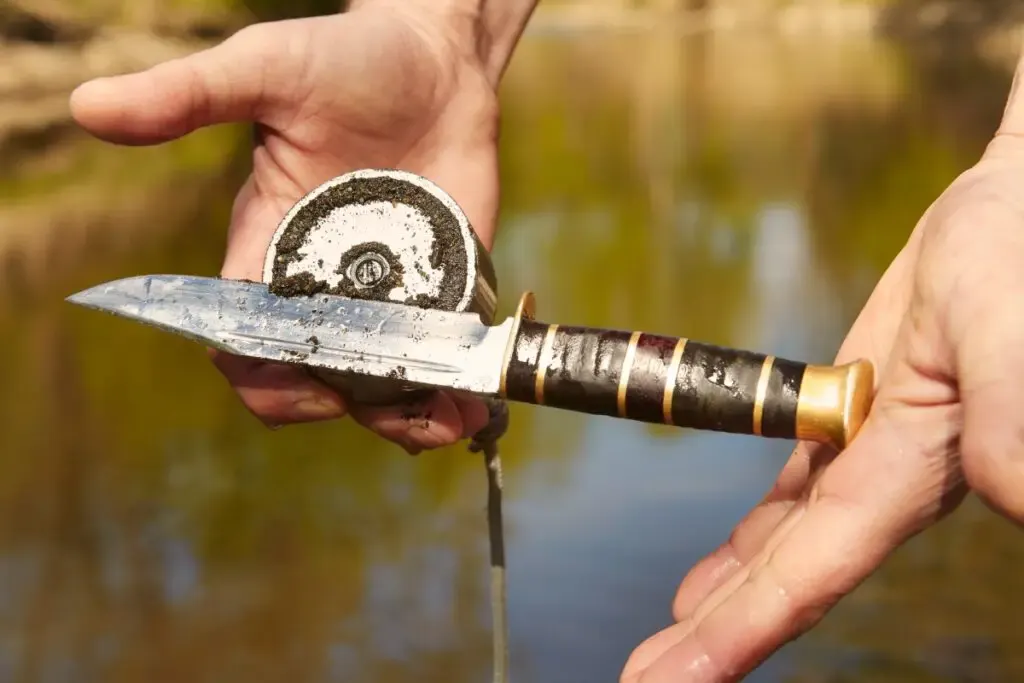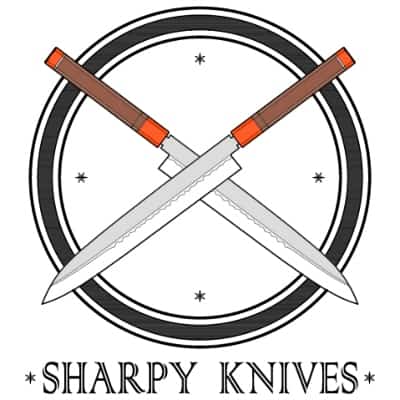As an Amazon Associate, we earn from qualifying purchases with no additional costs for you.
Many ask this relevant question – is a magnetic knife blade good? If your knife is magnetic, it has a high iron content and will be attracted to a magnet. Most stainless steel and all carbon steel used to make knives are magnetic because they have high iron content. This property offers many advantages.
Magnetic knives are good. Magnetic knife blades are handy in many circumstances. They are easy to access and store safely. That being said, they are not always necessary. If you are passionate about your knives, this will come down to your preference.
There is also a need and a reason why knives are made from non-magnetic materials. The following article will explore this exciting subject’s whats, whys, and wherefores.

If you want to check out the best magnetic knife holders for walls, you can find them by clicking here (Amazon link).
Why Magnetic?
There are many complex answers to such a question, but it will help first to understand the difference between the terms magnetic and magnet. A magnet is a material, usually metal, with magnetism induced into it.
The region around the magnet, in which there is a magnetic force, is called the magnetic field. This magnetic field can attract and/or stick to other magnetic materials.
Sometimes knowing “the what” helps one understand “the why”, so we will also dive into some technical stuff. Here you will find out how to identify if your knife is magnetic or non-magnetic and which is the best for you.
Magnetic materials themselves are not magnets. They will not attract or be attracted to other magnetic materials. But, because they have a high iron content, they are attracted by the magnetic field of a magnet and thus will stick to the magnet.
Some examples of non-magnetic materials, which will not stick to a magnet, are brass, copper, aluminum, plastic, wood, and ceramics.
Whether you need your knife to be magnetic is determined by the application and circumstances in which you are working with your knife. There is a need and use for knives made of magnetic materials.
Should My Knife be Magnetic?
Whether or not your knife blade should be magnetic depends entirely on the circumstances under which you intend to use it.
For instance, if you want to use the magnetic strip knife holder on your wall, the knives you put must be made from a magnetic material, or they will not stick to it.
Most modern stainless-steel knives have a high iron content and many other critical elements and are, therefore, magnetic.
One must understand that they are a product made from a magnetic material, they are not magnetized, so they are not magnets; there is a big difference. The magnetic means that they will stick to a magnet, not that they are magnets.
As opposed to stainless steel, knives are also made from carbon steel. This steel is magnetic as it also has a high iron content. Further properties are that it has a higher carbon content and a lower chromium content than stainless steel knives.
The downside is that carbon steel knives, with their low chromium content, are much more prone to rust than their stainless brothers.
The upside is that the steel is much harder than stainless steel so it can be sharpened to a finer edge. Because of the material’s toughness, this ultra-fine edge will hold its sharpness much longer than the softer stainless steel knives.
TIP: A standard method of storing knives is to mount a magnetic strip. But is this good for your knives? Do magnets damage knives? Find out the answer in the article below:
Do Magnets Damage Knives? Here’s the Complete Answer
Is a Knife Blade Attracted to a Magnet?
For a knife blade to be attracted to a magnet, such as the magnetic strip on a kitchen wall, it must be magnetic. Not all knives are magnetic, though. For example, a ceramic or plastic knife will not stick to a magnet.
Stainless steel knives, generally (we go into more detail on this later), and carbon steel knives, have a high iron content that enables them to be attracted to and stick to a magnet.
When a material is magnetized, it will have the properties of a magnet and will attract magnetic materials. In other words, it will perform just like a magnet.
The primary difference between a magnet and a magnetic material is that magnetic materials are attracted to magnets no matter which sides of the magnetic material are presented to the magnet. Magnetic materials touching or near each other will neither be attracted to nor repel each other.
On the other hand, a magnet placed against another magnet will either repel or be attracted to each other. This will depend on the arrangement’s polarity whereby opposite poles attract but as poles will repel.
TIP: If you are interested in buying a Japanese knife, we recommend these knives (Amazon links):
- Santoku: Yoshihiro NSW Hammered Damascus Santoku
- Gyuto: Yoshihiro VG-10 Hammered Damascus Gyuto
- Nakiri: Yoshihiro Hammered Damascus Nakiri
Why is My Knife Blade Magnetic?

If your knife is a carbon steel knife, it will have a high iron content and will thus be attracted to a magnet. That is, it is magnetic. Most stainless steel knives will have this high iron content and will be magnetic.
However, we are now going to complicate matters a little bit. While most stainless-steel knives will stick to a magnet because they are made of a magnetic material, some will not.
Martensitic and Austenitic are the two technical terms that differentiate stainless steel structures. You don’t need a degree in metallurgy to carry on reading; we will help you understand the basics.
All Martensitic stainless steels are ferromagnetic because the primary element is iron. They can also be hardened and tempered, thus making them ideal for knives.
This structure also gives the material magnetic properties whereby they could be magnetized, though one would not deliberately induce magnetism into a knife blade.
The steel’s microstructure is the definitive factor in the magnetic properties of Martisitic and Austenitic stainless steels.
Martensitic stainless steels have a high ferritic (iron) microstructure and are, therefore, magnetic. The Austenitic stainless steels have a high nickel content and are non-magnetic.
Martensitic stainless steel is also a great choice because, in a knife, hardness is critical. The alloys and structure of Martinsitic stainless steel permit the metal to be hardened and tempered to the degree suitable for knife blades.
The hardness makes for a much keener cutting edge. Of course, a huge bonus is that they are not so prone to rust as are the low chrome, high carbon steels.
The Martensitic steels, however, have a higher carbon content than most Austenitic materials; this reduces the corrosion resistance but increases the toughness and sharp edge retention.
TIP: Knives can be dangerous if they are stored incorrectly and can sustain damage to the cutting edge, severely damaging the blade. Check out the correct way of storing knives in the drawer below:
Storing Knives in a Drawer: 7 Ideas How to Do It Properly
Are All Knives Magnetic?
Ceramic, plastic, wooden, and stainless steel knives made from Austenitic steel are not magnetic; they will not stick to a magnetic holder, for example. These types of knives would be better off being stored in a knife block, knife wrap, or an individual sheath which is also known as a saya)
All Martensitic and most other hardenable stainless steels are ferromagnetic.
Due to the internal molecular stresses induced by the hardening process, these grades can exhibit permanent magnetic properties if magnetized in the hardened condition. Still, one is unlikely to require that element.
Knifemakers will usually have a de-magnetizer in their lineup of tools, as many stages in the production line can induce magnetism in the knife material. Grinding the blade, sharpening the blade, or even polishing the blade can cause a magnetic element within the material.
Naturally, this is undesirable as the now magnetized blade may collect magnetic filings, which can pick up dust and grit, making finishing difficult.
Tools, for example, spanners and screwdrivers, can also get magnetized because of repetitive directional use.
Simply dropping them on the floor usually creates enough shock to de-magnetize them. However, that may not be an excellent way to de-magnetize a valuable hardened knife blade.
BTW: If you are interested in buying the best cutting board, you can find our recommendations below:
- The best overall: Virginia Kitchen Boys Cutting Board (Amazon link). This fantastic cutting board is made from sustainable walnut wood from the United States and brings almost perfect safety when cutting with your knives.
- Alternative: Yoshihiro Cutting Board (Amazon link). Professional traditional Japanese cutting board that chefs around the world use.
- Cheaper option: Shun Cultery Cutting Board (Amazon link). Another Japanese cutting board stands out, especially for its simplicity and affordable price.
Conclusion
Knives that have magnetic properties are a great idea. They can be stuck to a wall magnet for easy access.
They can be stainless, which reduces corrosion preventative maintenance, or carbon steel, allowing the longest-lasting and keenest edge possible on a knife. Either way, magnetic knives make storage and access easier.
TIP: Many people are concerned that sharpening a knife every day will ruin the knife. Check out the answer and the explanation in the article below:
Answered: Can Sharpening a Knife Everyday Ruin Your Knives?
